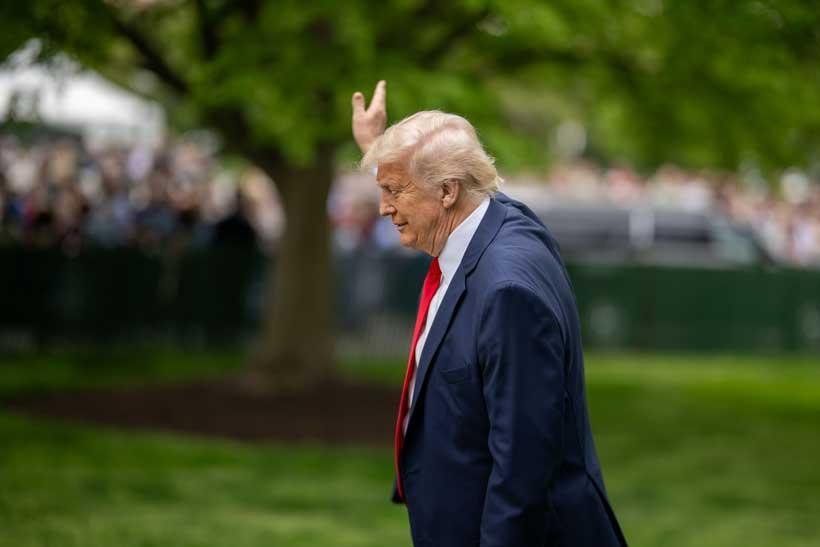By
Brian Hudson
Africa-Press – Kenya. In his second term, Donald Trump has embraced an even more aggressive and theatrical approach to foreign policy—a style that can aptly be called “bully diplomacy.” By projecting himself as a strongman leader, he has sought to coerce countries—from adversaries like Iran to nominal allies such as Ukraine—into accepting U.S. demands through threats, economic sanctions, and even military action. This strategy, rooted in extortion, rests on the belief that intimidation and unpredictability can quickly deliver political and economic concessions for the United States. In practice, however, this approach has not only failed to achieve its desired results but has led to repeated setbacks. From stalled nuclear negotiations with Iran and the botched military strike on its facilities in June 2025 to lost economic opportunities in Ukraine, Trump’s policies have damaged America’s global credibility, emboldened its adversaries, and alienated its allies.
A Strategy of Extortion: An Ineffective Formula
From the start of his second term, Trump has pursued a foreign policy grounded in displays of power and intimidation. Leveraging tools such as economic sanctions, threats of military action (and at times actual strikes), and relentless diplomatic pressure, he has tried to force other nations into accepting America’s terms. This so-called “strategy of extortion” appears deceptively simple: issue threats, secure concessions, and showcase the deal as a triumph. But in practice, the strategy has run aground—lacking strategic depth, overlooking geopolitical complexities, and miscalculating the motivations of global actors.
On Iran, Trump doubled down on his “maximum pressure” campaign from his first term. Having withdrawn from the nuclear deal (JCPOA) and imposed fresh sanctions, he threatened that if Iran did not return to talks, it would face crippling new sanctions and even military force. The apex of this approach came in June 2025, when the U.S. launched strikes on three Iranian nuclear sites—Fordow, Natanz, and Isfahan. Trump declared that these attacks, executed with 30,000-pound bunker-buster bombs and Tomahawk missiles, had “completely destroyed” Iran’s nuclear program. However, early intelligence assessments, including from the Defense Intelligence Agency (DIA), indicated the strikes caused no irreparable damage.
On Ukraine, Trump’s deal-making approach proved equally flawed. Ukraine, heavily reliant on American military and financial support to fend off Russian aggression, was viewed as a key ally. But by conditioning military aid on economic concessions—such as access to Ukraine’s lithium resources—Trump chilled the relationship. Negotiations over a major mining deal meant to secure U.S. access to Ukraine’s strategic lithium reserves appear to have collapsed. Trump’s silence on this failure not only exposed a diplomatic defeat but also signaled to U.S. allies that Washington’s support is conditional and unreliable.
Why Trump’s Bully Diplomacy Failed
The failure of Trump’s strategy can be traced to several core factors:
Misreading the Other Side’s Motivations
Trump assumed that all countries—whether foes or friends—would capitulate under economic and military pressure. But Iran, hardened by decades of sanctions, had already adapted its economy through trade with China and clandestine oil markets. The June 2025 strikes showed Iran was not cowed by military threats, responding instead with both military and diplomatic countermeasures, including missile attacks on a U.S. base in Qatar. Likewise, Ukraine, fighting for its survival against Russia, prioritized national security over cutting deals on strategic resources with the U.S.
Weakening Alliances
Trump’s extortion tactics failed to isolate America’s enemies but did succeed in pushing allies away. European countries, weary of Trump’s unilateralism, moved to strengthen their own strategic autonomy. In 2025, the EU launched initiatives to reduce reliance on the dollar in global trade and deepen ties with China and India. Even the U.K., one of America’s closest partners, declined formal requests to use its military bases in Diego Garcia or Cyprus for strikes on Iran.
Lack of Long-Term Planning
Trump’s approach prioritized short-term wins over sustainable strategy. The strike on Iran, carried out without a clear plan for managing the aftermath, merely escalated tensions. Undertaken without congressional authorization or allied support, the attack looked more like a political stunt than a genuine policy. This neglect of sustained diplomacy eroded international trust in the United States.
A New Multipolar World
By 2025, the global order was no longer one in which the U.S. could unilaterally impose its will. China’s rise as an economic and military powerhouse, along with greater independence among developing nations, meant countries had alternatives to simply yielding to Washington. Iran grew closer to China and Russia, while Ukraine began exploring other avenues for international support.
Consequences: U.S. Isolation and Lost Opportunities
The strike on Iran and the collapse of negotiations with Ukraine have had sweeping implications for America’s global standing. Internationally, U.S. credibility as a reliable mediator has eroded. Traditional allies, such as NATO countries, now approach Washington’s policies with increased caution, while adversaries like Iran act with greater confidence. Global reactions to the June 2025 strikes underscored America’s isolation: nations such as Saudi Arabia, the UAE, and Turkey condemned the attacks and called for a return to diplomacy. Meanwhile, China and Russia expanded their influence in the Middle East by stepping up support for Iran.
Domestically, Trump’s foreign policy has fueled public discontent. Recent polls (like Gallup’s June 2025 survey) show only 40% of Americans approve of Trump’s handling of foreign affairs, highlighting declining support for his aggressive posture. Criticism from Congress—particularly from Democrats but also some Republicans—reveals deep fractures in backing for Trump’s approach.
Moreover, the strike on Iran heightened the risk of a broader Middle East conflict. Iran’s threats to close the Strait of Hormuz, a crucial artery for global oil trade, signaled its capacity to disrupt the world economy. Coupled with missile attacks on U.S. and Israeli bases, it became clear that Trump’s bully diplomacy not only failed to achieve its aims but also pushed the region closer to all-out war.
Trump’s bully diplomacy—carried out under the guise of strongman leadership—has neither forced Iran into submission nor convinced Ukraine to strike favorable deals. Instead, it has left the United States more isolated on the world stage. The lesson of this failure is clear: effective diplomacy requires a blend of strength, negotiation, and alliance-building—not mere threats and intimidation. By ignoring this reality, Trump squandered diplomatic opportunities and left America in a more precarious position.
moderndiplomacy
For More News And Analysis About Kenya Follow Africa-Press






